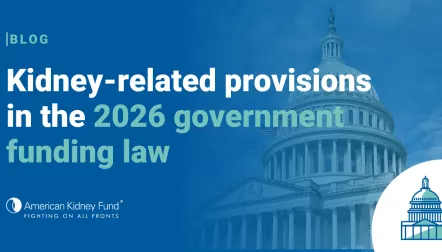
Blog post
Six provisions in the New Era for Preventing End-Stage Kidney Disease Act that will help people with rare kidney diseases
Of the 37 million Americans affected by kidney disease, nearly 810,000 are living with kidney failure, the leading causes of which are diabetes and high blood pressure. But did you know that there are 150 different disorders that are considered rare kidney diseases that can also lead to kidney failure? Unfortunately, there is less awareness of rare kidney diseases. They often go undiagnosed and they disproportionately affect people from communities of color.
To help address these issues, U.S. Reps. G.K Butterfield (D-NC) and Gus Bilirakis (R-FL) introduced the New Era for Preventing End-Stage Kidney Disease Act of 2022 (H.R. 7506). This bill would help raise more awareness of rare kidney disease, as well as increase research into the causes behind them and improve the diagnosis of and delivery of care to people with rare kidney diseases.
Here are six provisions in the New Era for Preventing End-Stage Kidney Disease Act that will help people with rare kidney diseases:
- Regional centers of excellence on rare kidney disease research at the National Institute of Diabetes and Digestive and Kidney Diseases (NIDDK)
NIDDK currently funds centers of excellence focused on pediatric nephrology and polycystic kidney disease, but none on rare kidney disease. With the creation of new centers focused on rare kidney diseases, the NIDDK will help increase awareness of rare kidney diseases and develop resources for clinical research. The centers will also provide training for health care professionals, which will include information on the diagnosis, prevention and treatment of rare kidney disease. - National Institutes of Health (NIH) rare kidney disease research grants
These grants will be for public and nonprofit organizations to conduct research on the causes, symptoms, diagnosis, progression and treatment of rare kidney diseases. Grant-funded research will be required to include people of color in study populations; it may not discriminate against people with disabilities. - A conference on diagnostic methods for rare kidney disease, convened by the secretary of the Department of Health and Human Services (HHS)
The bill also requires a study on whether genetic and genomic testing can improve preventative care, health outcomes and/or health disparities for people with rare kidney diseases. Additionally, the study will examine whether the federal government can reduce barriers for people to get genetic and genomic testing for rare kidney disease. - A study of the social, behavioral and biological factors leading to rare kidney disease
The secretary of HHS will conduct the study, which will examine factors like treatment patterns, access to nephrologists and patient trust in their treating providers. The study will also look at the ongoing efforts and recommendations to slow the progression to kidney failure in populations that are disproportionately affected by rare kidney disease. - A "Communities of Color Service Program" of nephrology fellowships in underserved areas
The fellowships will help educate providers about rare kidney disease, strengthen the nephrology workforce and improve kidney care for people of color. The bill also directs the NIH to report on diversity in research programs. - Grant programs for primary care provider training and for kidney disease-related continuing education for health care professionals
These grant programs will help strengthen the primary care workforce, educating providers about rare kidney disease, which will improve the diagnosis of and treatment of rare kidney disease.
The American Kidney Fund (AKF) supports H.R. 7506 and applauded its introduction in a press release. The legislation aligns with our Unknown Causes of Kidney Disease (UCKD) Project, which seeks to improve understanding of how undiagnosed and misdiagnosed causes of kidney disease directly impact care and outcomes. Understanding rare kidney diseases and other types of diseases that lead to kidney disease is a major focus of the UCKD project.
If you would like to help advocate for people living with a rare kidney disease, we encourage you to contact your elected officials and ask for their support for this important bill.





